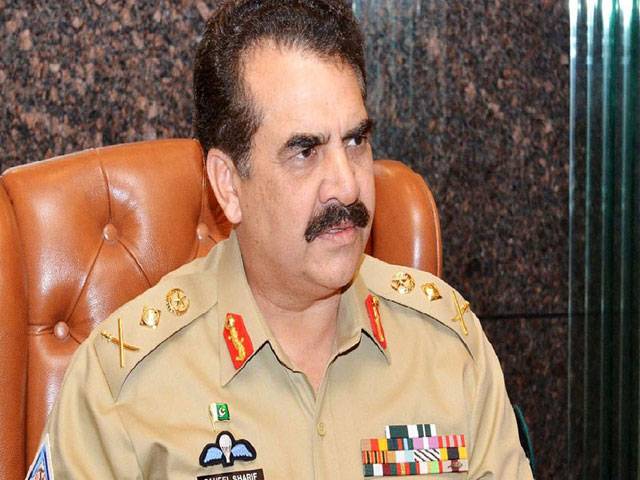ISLAMABAD - Chief of Army Staff General Raheel Sharif yesterday confirmed the death sentences of 11 convicts tried by military courts for terrorism-related offences.
According to military’s media wing Inter-Services Public Relations (ISPR), the "hardcore terrorists" had been convicted of offences including killing and kidnapping civilians, attacks on the Armed Forces and LEAs and destruction of schools and communications infrastructure.
All the convicted terrorists belonged to the Tehreek-e-Taliban Pakistan (TTP), a terrorist outfit with its headquarters in the North Waziristan Agency whose thousands of hardcore fighters have either been eliminated, arrested or injured by Pakistan Army through its lethal operation Zarb-e-Azb.
According to details of each of 11 convicts Muhammad Umar s/o Daleel Khan: was an active TTP member involved in attacking Armed Forces of Pakistan and LEAs which resulted in death of soldiers and injuries to police officials.
He was also involved in making of explosives.
He admitted his offences before the Magistrate and the trial court. He was tried on 3 charges and awarded death sentence.
Hameedullah s/o Muhammad Ghazi, Rehmatullah s/o Umar Din, Muhammad Nabi s/o Dilawar Shah and Maulvi Dilbar Khan s/o Kashkar were four among the convicts belonged to the TTP.
They were involved in attacking LEAs which resulted in deaths of Senior Superintendent of Police Muhammad Hilal Khan, Colonel Mustafa Jamal and Captain Ishfaq. They were also in possession of fire arms and explosives.
The convicts admitted their offences before the magistrate and the trial court. Convict numbers 1 and 2 were tried on three charges, convict number 3 was tried on two charges and convict number four was tried on one charge and all were awarded death sentence.
Rizwanullah s/o Taj Mir Khan was an active member of TTP.
He was involved in killing of a civilian, kidnapping a WAPDA employee and attacking Armed Forces which resulted in injuries to an officer and a soldier. He was also in possession of fire arms and explosives.
He admitted his offences before the Magistrate and trial court. He was tried on five charges and awarded death sentence.
Gul Rehman s/o Zareen convict was an active member of TTP. He was involved in attacking Armed Forces which resulted in death of a civilian and a soldier. He was also in possession of explosives.
The convict admitted his offences before the Magistrate and trial court. He was tried on two charges and awarded the death sentence.
Muhammad Ibrahim s/o Maseen was an active member of TTP. He was involved in attacking Armed Forces and destruction of Babu Chamtalai Bridge which resulted in the deaths of civilians and a soldier. He was also in possession of explosives. The convict admitted his offences before the Magistrate and the trial court.
He was tried on four charges and awarded death sentence.
Sardar Ali s/o Muhammad Akram Khan was an active member of TTP. He was involved in attacking Armed Forces and destruction of educational institutions which resulted in injuries and death of soldiers. He was also in possession of explosives.
The convict admitted his offences before the Magistrate and the trial court. He was tried on three charges and awarded the death sentence.
Sher Muhammad Khan s/o Ahmed Khan was an active member of TTP. He was involved in killing of a civilian and attacking Armed Forces which resulted in injuries and deaths of soldiers. He was also in possession of fire arms and explosives. The convict admitted his offences before the Magistrate and the trial court.
He was tried on 4 charges and awarded the death sentence.
Muhammad Jawad s/o Muhammad Musa was an active member of TTP. He was involved in attacking LEAs and killing of a civilian. He was also in possession of fire arms, ammunition and explosives. The convict admitted his offences before the trial court. He was tried on four charges and awarded death sentence.
Earlier on March 15, the Army Chief had confirmed death sentences of 13 militants, including one involved in the killing foreign tourists in Nanga Parbat.
According to the ISPR, the condemned terrorists were tried by military courts for their involvement in Nanga Parbat attack, Saidu Sharif Airport, destruction of schools, attacks on Armed Forces, law-enforcement agencies and civilians.
Pakistan has been battling a homegrown Islamist insurgency for over a decade following its decision to side with the US-led coalition which toppled the Taliban in neighbouring Afghanistan.
Since June 2014 its troops have been engaged in a full-scale offensive against Taliban and other militants in the North Waziristan and Khyber tribal districts in the northwest.
The fight gained renewed impetus following a Taliban massacre at a Peshawar Army school in December 2014 in which 134 children were killed.
The attack sparked widespread outrage and led to a series of measures aimed at combating terror.
Among other measures the govt ended a six-year moratorium on executions - initially only for people convicted of terrorism but later for all capital offences.
Pakistan also amended its Constitution to allow military courts to try terror suspects for a two-year period.
Supporters of the courts state that the cases previously dragged on for years and many suspects escaped punishment due to legal loopholes or intimidation of witnesses.
But the country's growing use of the death penalty has come in for international criticism.
The nation has hanged hundreds of people - 326 last year alone - since lifting a moratorium on the death penalty in December 2014.






